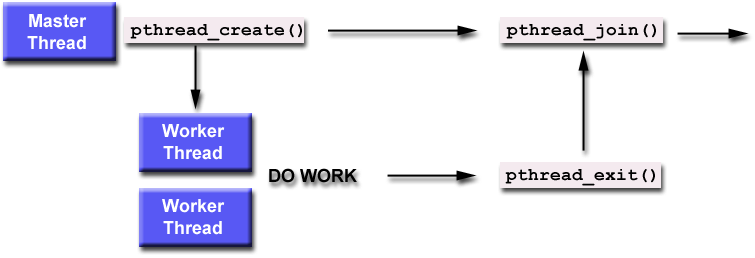Joining and Detaching Threads
Routines:
pthread_attr_setdetachstate(attr, detachstate)
pthread_attr_getdetachstate(attr)
Joining:
“Joining” is one way to accomplish synchronization between threads. For example:

The pthread_join() subroutine blocks the calling thread until the specified thread terminates.
The programmer is able to obtain the target thread’s termination status if it was specified in the target thread’s call to pthread_exit().
A thread can only be joined once. It is a logical error to attempt multiple joins on the same thread.
Two other synchronization methods, mutexes and condition variables, will be discussed later.
Joinable or Not?
When a thread is created, one of its attributes defines whether it is joinable or detached. Only threads that are created as joinable can be joined. If a thread is created as detached, it can never be joined.
The final draft of the POSIX standard specifies that threads should be created as joinable.
To explicitly create a thread as joinable or detached, the attr argument in the pthread_create() routine is used. The typical 4-step process is:
- Declare a pthread attribute variable of the
pthread_attr_tdata type - Initialize the attribute variable with
pthread_attr_init() - Set the attribute detached status with
pthread_attr_setdetachstate() - When done, free library resources used by the attribute with
pthread_attr_destroy()
Detaching
The pthread_detach() routine can be used to explicitly detach a thread even though it was created as joinable.
There is no converse routine.
Recommendations:
If a thread requires joining, consider explicitly creating it as joinable. This provides portability as not all implementations may create threads as joinable by default.
If you know in advance that a thread will never need to join with another thread, consider creating it in a detached state, as this may reduce overhead.
Pthreads Joining Example
#include <pthread.h>
#include <stdio.h>
#include <stdlib.h>
#include <math.h>
#define NUM_THREADS 4
void *BusyWork(void *t)
{
int i;
long tid;
double result = 0.0;
tid = (long)t;
printf("Thread %ld starting...\n",tid);
for (i=0; i<1000000; i++)
{
result = result + sin(i) * tan(i);
}
printf("Thread %ld done. Result = %e\n", tid, result);
pthread_exit((void*) t);
}
int main (int argc, char *argv[])
{
pthread_t thread[NUM_THREADS];
pthread_attr_t attr;
int rc;
long t;
void *status;
/* Initialize and set thread detached attribute */
pthread_attr_init(&attr);
pthread_attr_setdetachstate(&attr, PTHREAD_CREATE_JOINABLE);
for(t = 0; t < NUM_THREADS; t++) {
printf("Main: creating thread %ld\n", t);
rc = pthread_create(&thread[t], &attr, BusyWork, (void *)t);
if (rc) {
printf("ERROR; return code from pthread_create() is %d\n", rc);
exit(-1);
}
}
/* Free attribute and wait for the other threads */
pthread_attr_destroy(&attr);
for(t=0; t<NUM_THREADS; t++) {
rc = pthread_join(thread[t], &status);
if (rc) {
printf("ERROR; return code from pthread_join() is %d\n", rc);
exit(-1);
}
printf("Main: completed join with thread %ld having a status
of %ld\n",t,(long)status);
}
printf("Main: program completed. Exiting.\n");
pthread_exit(NULL);
}
See the source code here.
Output:
Main: creating thread 0
Main: creating thread 1
Thread 0 starting...
Main: creating thread 2
Thread 1 starting...
Main: creating thread 3
Thread 2 starting...
Thread 3 starting...
Thread 1 done. Result = -3.153838e+06
Thread 0 done. Result = -3.153838e+06
Main: completed join with thread 0 having a status of 0
Main: completed join with thread 1 having a status of 1
Thread 3 done. Result = -3.153838e+06
Thread 2 done. Result = -3.153838e+06
Main: completed join with thread 2 having a status of 2
Main: completed join with thread 3 having a status of 3
Main: program completed. Exiting.





